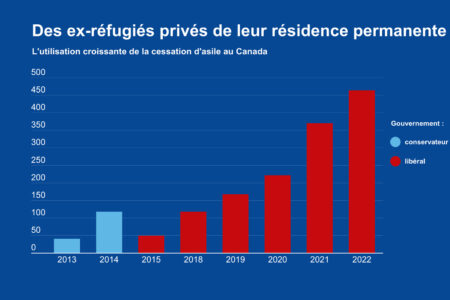
Last year, between 900 and 1,000 individuals and their families were deemed medically inadmissible to Canada because of the “excessive demand” provision in section 38(1)(c) of the Immigration and Refugee Protection Act. These are people who have been working hard for years in Canada, who are paying their taxes in Canada, who have a network of support or an extended family in Canada. And when they apply for permanent residency, they are told, after years of navigating a cumbersome administrative process, that, for instance, their child with a disability “might reasonably be expected to cause excessive demand on health or social services.”
In December 2017, the parliamentary Standing Committee on Citizenship and Immigration (known as CIMM) recommended the repeal of the excessive demand provision. The Minister of Immigration, Refugees and Citizenship, Ahmed Hussen, had acknowledged before the committee a few weeks earlier that this provision, after being enforced for several decades, is not compatible with our Canadian values. He left open all policy options, ranging from incremental changes to a full repeal, and promised to act within months. But the minor revisions he announced on April 16 to “[bring] medical inadmissibility policy in line with inclusivity for persons with disabilities” fall short.
The provision has affected people such as Karen Talosig, who came to Canada in 2007. In 2010 she applied for permanent residency for herself and her deaf daughter, Jazmine, who had stayed in the Philippines. Immigration, Refugees and Citizenship Canada informed Talosig in 2014 that her daughter was medically inadmissible to Canada because of the possibility of “excessive demand.” Letters of support from a school board and a school for the deaf emphasized that Jazmine would not require any additional education costs. One of Talosig’s four employers lamented that “the mother has to either give up her rights to the child or leave Canada. Neither of which is a good option.” The administrative decision was reversed, on humanitarian and compassionate grounds, and Karen and Jazmine were eventually reunited in Canada.
The medical inadmissibility provision is 40 years old, though similar provisions have been in place in Canada for at least 150 years. When administrators conclude that applicants’ medical conditions or disabilities could cause excessive demand on services, the ruling can create a range of challenges for families and individuals, from lengthy and complex paperwork all the way to deportation. The Warkentin family, with a daughter with special needs, faced a deportation order, but they were eventually allowed to renew their permanent residency; the Montoya family, whose son has Down syndrome, had to leave Canada before the administrative decision was overturned.
As one witness before the committee said, if Terry Fox and Rick Hansen were applying for permanent residency in Canada, both of them would be denied under the excessive demand provision.
Others affected by the application of section 38(1)(c) have been persons under HIV treatment, and persons living and working in Canada who have suffered an accident that physically or mentally impaired them. Chris Mason, a permanent resident who became paraplegic while working, was deported. As one witness before the CIMM said, if Terry Fox and Rick Hansen were applying for permanent residency in Canada, both of them would be denied under the excessive demand provision. What would Canada look like without them?
The flawed logic behind this provision is that excessive demand would put pressure on “existing waiting lists and would increase the rate of mortality and morbidity in Canada.” The data available are only approximate and utterly unconvincing: these people may cost the system between 0.01 and 0.1 percent of Canada’s total annual health care and social costs. Moreover, while section 38(1)(c) applies only to the economic immigration category, the two other categories (family and refugee) have not been subjected to it for years, and Canada’s health care and social systems have not been bankrupted by families and refugees.
There are financial and psychological costs for these families, and Canadian taxpayers end up paying a substantial bill for the government to defend the provision in court.
Those who can afford an immigration consultant or a lawyer may challenge these administrative decisions in court. To convince judges that they will not cause excessive demand in Canada, these families generally either argue that the federal government did not apply the assessment rules correctly to individual cases (Hilewitz v. Canada) or propose mitigation plans to demonstrate that they can afford out-of-pocket health care and social costs (Hassan Chaudry v. Canada). There are financial and psychological costs for these families, and Canadian taxpayers end up paying a substantial bill for the government to defend the provision in court. Families who cannot afford to go to court are able neither to challenge the assessments nor to propose mitigation plans. Scott Macdonald, a Toronto immigration consultant, recently argued that the excessive demand provision is “anti-poor.”
Taking a broader view, numerous scholars, lawyers and advocates argue that section 38(1)(c) is not compatible with several international treaties that are binding on Canada, such as key United Nations human rights conventions, including the Convention on the Rights of the Child and the Convention on the Rights of Persons with Disabilities (CRPD). Maurice Tomlinson, senior policy analyst at the Canadian HIV/AIDS Legal Network, told the CIMM, “Article 18 of the [CRPD] specifically calls on states parties to ‘recognize the rights of persons with disabilities to liberty and movement, to freedom to choose their residence, and to a nationality.’ The excessive demand regime clearly violates this convention.” Tomlinson also noted, “What is ironic is that we ratified the [CPRD] at the start of the Vancouver Paralympic Games, when we welcomed the world of disabled individuals to Canada. You could play here; you just couldn’t stay here. That’s the message that was sent.”
Our country, renowned for its international role and eager to get a seat at the UN Security Council in 2021-22, has been breaching these treaties for decades. If Canada is serious about this bid, the excessive demand provision should be removed, because voting nations inspect meticulously the candidates’ public track record in international law.
Moreover, on this score, Canada is lagging behind many developed countries that do not have an excessive demand provision and whose health and social services are functioning effectively: for instance, Ireland, Sweden, Norway, Denmark and Iceland. The United Kingdom, which had the provision before us, got rid of its own a few years ago.
Minister Hussen’s decision to make only minor adjustments to the provision, while the federal government keeps working with provinces and territories toward a full repeal, is a missed opportunity. Instead of maintaining a disgraceful ableist approach to our immigration policy, we should embrace a respectful, engaging and inclusive model, as disability rights organizations have suggested for years.
Canadians will look back one day and wonder why nothing was done in 2018 to put an end to an unfair, costly and ineffective policy. All provinces and territories except Saskatchewan support the repeal of the excessive demand provision. The CIMM heard an overwhelming call for repeal from representative organizations and individuals.
In 2018, this government had the opportunity to end nearly 150 years of discrimination against people with disabilities in Canadian immigration legislation and policies. Canada needs more people like Terry Fox and Rick Hansen, but when will we welcome them?
Photo: Nico Montoya, who has Down syndrome, poses in front of a basketball net at his home in Richmond Hill, Ont., in March 2016. His family, including Ontario university professor Felipe Montoya, was originally denied permanent residency in Canada because of the potential burden the child would place on the health care system. Their application was ultimately allowed on compassionate grounds. THE CANADIAN PRESS/Mark Blinch
Do you have something to say about the article you just read? Be part of the Policy Options discussion, and send in your own submission. Here is a link on how to do it. | Souhaitez-vous réagir à cet article ? Joignez-vous aux débats d’Options politiques et soumettez-nous votre texte en suivant ces directives.










